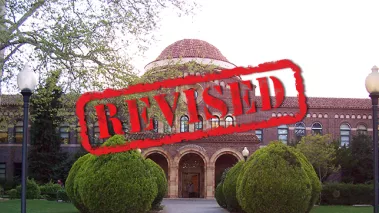Table of Contents
Speech Code of the Month: California State University - Chico

FIRE announces its Speech Code of the Month for March 2011: California State University - Chico.
We frequently talk about the impact of speech codes on student speech. But speech codes can affect faculty members, too, and the ability of faculty to teach controversial or sensitive material without fear of punishment is critical to the functioning of a university. That is why CSU Chico's definition of sexual harassment [.pdf] is so profoundly troubling:
Teachers who make disparaging remarks about or implicitly devalue students for their gender or sexual orientation can undermine students' academic, professional, and personal growth just as much as those who make discriminations based on race, religion, age, or other physical or cultural characteristics.
Examples of this type of sexual harassment include
1. Explicit use of derogatory terms or stereotypic generalizations.
2. Use of "humorous" images or statements that demean or trivialize people because of gender or sexual orientation.
3. Reinforcement of sexist stereotypes through subtle, often unintentional means, such as using classroom examples in which professional people like psychologists, managers, or politicians are always referred to as men. Similarly, gays and lesbians may habitually be associated only with certain professions.
4. Continual use of generic masculine terms such as to refer to people of both sexes or references to both men and women as necessarily heterosexual.
5. Statements which imply that certain racial or ethnic groups are more sexually active than others.
6. Habitually recognizing and calling on one gender more than another during class discussions.
7. Interrupting one gender more often than another or allowing others in the class to do so.
(Emphases added).
Unintentional reinforcement of sexist stereotypes is sexual harassment? Statements that subjectively "trivialize" people on the basis of gender or sexual orientation are sexual harassment? A look through CSU Chico's course catalog reveals that, as would be expected at a major university, the university offers courses that necessarily involve sensitive issues relating to race, gender, and sexual orientation. In the university's Multicultural and Gender Studies department, for example, course offerings include "Gay, Lesbian, Bisexual, Transgender, and Queer Issues and Identities"; "Perspectives on Gender and Disease"; "Multicultural Health"; "Sociology of Gender"; "Women, Men and the Media"; and "Cultural Images of Women."
Now look back over those bolded examples of sexual harassment and think about whether, as a faculty member teaching one of these courses, or one of the many other course offerings that touch on issues of race, gender, and sexual orientation, you might fear running afoul of this policy when discussing controversial but wholly germane subjects in your classroom. In FIRE's experience, concern over a policy like this one is far from hypothetical; since our inception, we have handled all too many cases involving faculty members who faced discipline for classroom expression that should have been wholly protected by the principles of free speech and academic freedom.
For these reasons, CSU Chico is our March 2011 Speech Code of the Month. If you believe that your college's or university's policy should be a Speech Code of the Month, please e-mail speechcodes@thefire.org with a link to the policy and a brief description of why you think attention should be drawn to this code. If you are a current college student or faculty member interested in these issues, consider joining FIRE's Campus Freedom Network, a network of college faculty members and students dedicated to advancing individual liberties on their campuses. And if you would like to help fight abuses at universities nationwide, add FIRE's Speech Code of the Month Widget to your blog, website, or Facebook profile and help shed some much-needed sunlight on these repressive policies.
Recent Articles
FIRE’s award-winning Newsdesk covers the free speech news you need to stay informed.

FIRE and coalition partners file brief rebuking the U.S. government for attempting to deport Mahmoud Khalil for his protected speech

American Jews must not give an inch on free speech — even when words hurt us

FIRE and civil liberties groups challenge 'unconstitutional retaliation' against Mahmoud Khalil
